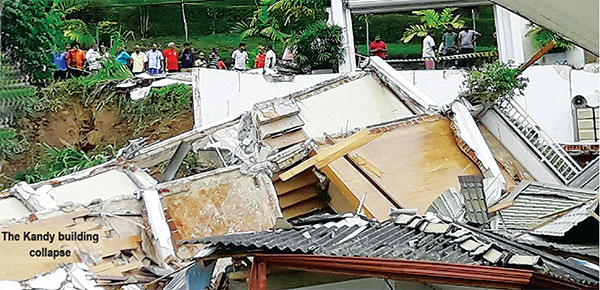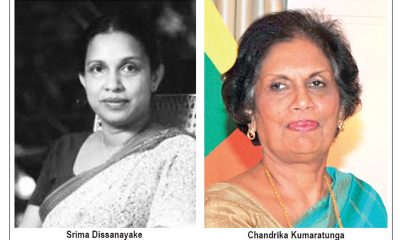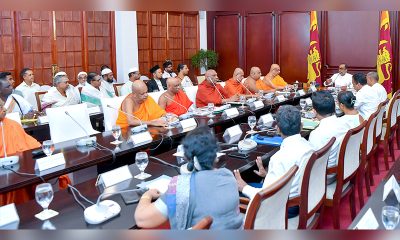Features
Kandy tragedy: Urgent action needed to regulate building industry

By Gamini Ranasinghe
Chartered Engineer
gamini_r@hotmail.com
The building disaster that killed a family in Kandy, a few weeks ago, is surely the result of the callous behaviour of a few officials who value the money above human lives. As any other current social issue in Sri Lanka, this serious offence will be forgotten with the passage of time. With the lack of effective and workable regulations and other factors such as the scarcity of buildable land in urban areas, the problems may worsen further. From time to time you may hear such incidents, but unless it affects you it will be just a problem of others. Malpractices in the building industry will continue.
If we are to prevent the recurrence of such disasters, it is of utmost importance for the relevant authorities to find ways and means of tackling this problem without dragging their feet any further.
When you look into the main causes of the aforesaid disaster or any other building failure in the country the following stand out:
(a) Inadequacy of Effective Building Regulations
At present, there is no statutory Building Act applicable to the whole country unlike in many other countries including some in Asia. For example, countries like Singapore, Malaysia, Thailand, Hongkong and even Vietnam have well-drafted building Acts to regulate the construction industry. The main purpose of such regulations is to provide safe buildings for human occupation. In this respect, first and foremost the country needs a proper building Act. When approved by Parliament it will be a statutory document, normally called a Building Act, which all building works in the country will have to adhere to.
Such a Building Act shall address the following purposes among others:
Providing for the clear regulation to be adopted for building work, and the setting of performance standards for buildings to ensure that
(i) People who use buildings can do so safely and without endangering their health and safety
(ii) Buildings have attributes that contribute appropriately to the health, physical independence, and well-being of the people who use them
(iii) People who use a building can escape from the building in case of a fire or a likely physical failure
(iv) Identifying the accountability of owners, designers, builders, and local authorities who have responsibilities for ensuring that the building work complies with the approved building standards.
The items (i) to (iii) address the principles to be followed in the design and construction of a building to suit human habitation. The minimum design and construction expectations encompassing all the aspects of a building, from planning through architecture, structure, fire and building services shall be clearly identified explicitly in the building Act. The Building Act shall refer to the minimum standards to be followed in each area of design and construction of the buildings.
Accountability identified in item (iv) is directly tied to the responsibilities of the designers and builder and the local authority concerned. Unless it is a minor building, it is unlikely that the local authority will be a party to design and construction supervision. Under such circumstances, to make each process accountable, the Chartered Architects and Engineers practising in the respective fields shall submit the design certificates (producer statements) for the work they have produced. Such document shall certify the compliance of their design to the particular clauses of the building code. The purpose of such document is to indemnify the owner from defects and dangers resulting from negligence or oversight in the design stage. The party who submit this document need to produce an insurance policy to a minimum value equivalent to the work he has undertaken. The producer statement/ design certificate shall accompany the application for the building permit.
If the designer is not capable of submitting a design statement or a producer statement, the local authority shall appoint an external consultant to carry out a review of the design documents. If the documents comply with the relevant clauses of the building code, the checker needs to issue a design certificate/producer statement that will also indemnify the owner of the building. In a situation where an external consultant is involved, the fees payable shall be agreed prior to the commencement of the process.
The supervision of construction of the specifically designed items shall also be carried out as said for the design stage. The certifying chartered engineer or architect as appropriate to the works needs to issue a compliance certificate(s) on the completion of the project. He should carry an insurance policy to indemnify the owner from any financial loss incurred during the life span of the structure. When the applicant cannot obtain the services of a chartered engineer to supervise the construction works, the process of obtaining the services of an external engineer needs to be adopted as at the construction stage.
The Building Act shall clearly note that depending on circumstances, the person responsible for any inadequacy in the design and construction stage of a building may also face criminal charges in the countries judicial system
(b) Non-clarity of minimum standards to be adopted in the design and/ or construction
At present, in many aspects of the building design and construction, the minimum standards to be adopted are not clearly defined. Hence, the design professionals may apply many different international standards as per their training and exposure. The Building Act shall identify the respective building standards that need to be applicable to all types of structures. Such standards shall cover both the building and construction processes. These standards shall be identified with the concurrence of local professional bodies and institutions. The standards identified in the Building Act shall cover architectural, structural and utilities and building services aspects among others. If local standards are not available, the suitable international standards shall be identified.
(c) Statutory requirements to use skilled labour
Training of building skills are outside the Building Act. However, the building Code may make reference to the right standards of skills needed in each trade. The present acute shortage of labour with right skills to carry out the works in almost every building trade is obvious. The building failures may be a direct result of this problem. To prevent the occurrence of such disasters, the authorities concerned must consider it their duty to provide right training and certification of workers required in the building industry.
(d) Simple Buildings
There will be simple structures that need not to involve the procedures identified under Item (a) The Building Act shall clearly set out the physical and monetary limits of such works. It shall also set out rules, regulations and responsibilities the local councils need to follow when they are directly involved at the planning or design or construction stage of a project.
The formulation of a Building Act and a Building Code for Sri Lanka is the prime and urgent responsibility of the central government. I believe that the Urban Development Authority (UDA) needs to play a pivotal role in such a process. The most salient aspect here will be the composition of the team and committees who will take the responsibility for drafting documents of national importance. Representatives of professional bodies connected to the building industry in the areas of Architecture, Planning, Engineering and Building Industry are required play major roles in the drafting of such documents.
Since such documents become statutory when approved, the input of the Attorney General’s Department will be required throughout the process. The government may solicit the services of experts from our neighbouring countries if need be.
Features
US-CHINA RIVALRY: Maintaining Sri Lanka’s autonomy

During a discussion at the Regional Center for Strategic Studies (RCSS) in Sri Lanka on 9 December, Dr. Neil DeVotta, Professor at Wake Forest University, North Carolina, USA commented on the “gravity of a geopolitical contest that has already reshaped global politics and will continue to mould the future. For Sri Lanka – positioned at the heart of the Indian Ocean, economically fragile, and diplomatically exposed- his analysis was neither distant nor abstract. It was a warning of the world taking shape around us” (Ceylon Today, December 14, 2025).
Sri Lanka is known for ignoring warnings as it did with the recent cyclone or security lapses in the past that resulted in terrorist attacks. Professor De Votta’s warning too would most likely be ignored considering the unshakable adherence to Non-Alignment held by past and present experts who have walked the halls of the Foreign Ministry, notwithstanding the global reshaping taking place around us almost daily. In contrast, Professor DeVotta “argued that nonalignment is largely a historical notion. Few countries today are truly non-aligned. Most States claiming neutrality are in practice economically or militarily dependent on one of the great powers. Sri Lanka provides a clear example while it pursues the rhetoric of non-alignment, its reliance on Chinese investments for infrastructure projects has effectively been aligned to Beijing. Non-alignment today is more about perceptions than reality. He stressed that smaller nations must carefully manage perceptions while negotiating real strategic dependencies to maintain flexibility in an increasingly polarised world.” (Ibid).
The latest twist to non-alignment is Balancing. Advocates of such policies are under the delusion that the parties who are being “Balanced” are not perceptive enough to realise that what is going on in reality is that they are being used. Furthermore, if as Professor DeVotta says, it is “more about perception than reality”, would not Balancing strain friendly relationships by its hypocrisy? Instead, the hope for a country like Sri Lanka whose significance of its Strategic Location outweighs its size and uniqueness, is to demonstrate by its acts and deeds that Sri Lanka is perceived globally as being Neutral without partiality to any major powers if it is to maintain its autonomy and ensure its security.
DECLARATION OF NEUTRALITY AS A POLICY
Neutrality as a Foreign Policy was first publicly announced by President Gotabaya Rajapaksa during his acceptance speech in the holy city of Anuradhapura and later during his inauguration of the 8th Parliament on January 3, 2020. Since then Sri Lanka’s Political Establishment has accepted Neutrality as its Foreign Policy judging from statements made by former President Ranil Wickremesinghe, Prime Minister Dinesh Gunawardena and Foreign Ministers up to the present when President Dissanayake declared during his maiden speech at the UN General Assembly and captured by the Head Line of Daily Mirror of October 1, 2025: “AKD’s neutral, not nonaligned, stance at UNGA”
The front page of the Daily FT (Oct.9, 2024) carries a report titled “Sri Lanka reaffirms neutral diplomacy” The report states: “The Cabinet Spokesman and Foreign Minister Vijitha Herath yesterday assured that Sri Lanka maintains balanced diplomatic relations with all countries, reaffirming its policy of friends of all and enemy of none”. Quoting the Foreign Minister, the report states: “There is no favouritism. We do not consider any country to be special. Whether it is big or small, Sri Lanka maintains diplomatic relations with all countries – China, India, the US, Russia, Cuba, or Vietnam. We have no bias in our approach, he said…”
NEUTRALITY in OPERATION
“Those who are unaware of the full scope and dynamics of the Foreign Policy of Neutrality perceive it as being too weak and lacking in substance to serve the interests of Sri Lanka. In contrast, those who are ardent advocates of Non-Alignment do not realize that its concepts are a collection of principles formulated and adopted only by a group of like-minded States to meet perceived challenges in the context of a bi-polar world. In the absence of such a world order the principles formulated have lost their relevance” (https://island.lk/relevance-of-a neutral-foreign-policy).
“On the other hand, ICRC Publication on Neutrality is recognized Internationally “The sources of the international law of neutrality are customary international law and, for certain questions, international treaties, in particular the Paris Declaration of 1856, the 1907 Hague Convention No. V respecting the Rights and Duties of Neutral Powers and Persons in Case of War on Land, the 1907 Hague Convention No. XIII concerning the Rights and Duties of Neutral Powers in Naval War, the four 1949 Geneva Conventions and Additional Protocol I of 1977 (June 2022)” (Ibid).
“A few Key issues addressed in this Publication are: “THE PRINCIPLE OF INVOILABILITY of a Neutral State and THE DUTIES OF NEUTRAL STATES.
“In the process of reaffirming the concept of Neutrality, Foreign Minister Vijitha Herath stated that the Policy of Neutrality would operate in practice in the following manner: “There is no favoritism. We do not consider any country to be special. Whether it is big or small, Sri Lanka maintains diplomatic relations with all countries – China, India, the US, Russia, Cuba or Vietnam. We have no bias in our approach” (The Daily FT, Oct, 9, 2024).
“Essential features of Neutrality, such as inviolability of territory and to be free of the hegemony of power blocks were conveyed by former Foreign Minister Ali Sabry at a forum in Singapore when he stated: “We have always been clear that we are not interested in being an ally of any of these camps. We will be an independent country and work with everyone, but there are conditions. Our land and sea will not be used to threaten anyone else’s security concerns. We will not allow military bases to be built here. We will not be a pawn in their game. We do not want geopolitical games playing out in our neighbourhood, and affecting us. We are very interested in de-escalating tensions. What we could do is have strategic autonomy, negotiate with everyone as sovereign equals, strategically use completion to our advantage” (the daily morning, July 17, 2024)
In addition to the concepts and expectations of a Neutral State cited above, “the Principle of Inviolability of territory and formal position taken by a State as an integral part of ‘Principles and Duties of a Neutral State’ which is not participating in an armed conflict or which does not want to become involved” enabled Sri Lanka not to get involved in the recent Military exchanges between India and Pakistan.
However, there is a strong possibility for the US–China Rivalry to manifest itself engulfing India as well regarding resources in Sri Lanka’s Exclusive Economic Zone. While China has already made attempts to conduct research activities in and around Sri Lanka, objections raised by India have caused Sri Lanka to adopt measures to curtail Chinese activities presumably for the present. The report that the US and India are interested in conducting hydrographic surveys is bound to revive Chinese interests. In the light of such developments it is best that Sri Lanka conveys well in advance that its Policy of Neutrality requires Sri Lanka to prevent Exploration or Exploitation within its Exclusive Economic Zone under the principle of the Inviolability of territory by any country.
Another sphere where Sri Lanka’s Policy of Neutrality would be compromised is associated with Infrastructure Development. Such developments are invariably associated with unsolicited offers such as the reported $3.5 Billion offer for a 200,000 Barrels a day Refinery at Hambantota. Such a Project would fortify its presence at Hambantota as part of its Belt and Road Initiative. Such offers if entertained would prompt other Global Powers to submit similar proposals for other locations. Permitting such developments on grounds of “Balancing” would encourage rivalry and seriously threaten Sri Lanka’s independence to exercise its autonomy over its national interests.
What Sri Lanka should explore instead, is to adopt a fresh approach to develop the Infrastructure it needs. This is to first identify the Infrastructure projects it needs, then formulate its broad scope and then call for Expressions of Interest globally and Finance it with Part of the Remittances that Sri Lanka receives annually from its own citizens. In fact, considering the unabated debt that Sri Lanka is in, it is time that Sri Lanka sets up a Development Fund specifically to implement Infrastructure Projects by syphoning part of the Foreign Remittances it receives annually from its citizens . Such an approach means that it would enable Sri Lanka to exercise its autonomy free of debt.
CONCLUSION
The adherents of Non-Alignment as Sri Lanka’s Foreign Policy would not have been pleased to hear Dr. DeVotta argue that “non-alignment is largely a historical notion” during his presentation at the Regional Center for Strategic Studies in Colombo. What is encouraging though is that, despite such “historical notions”, the political establishment, starting with President Gotabaya Rajapaksa and other Presidents, Prime Ministers and Ministers of Foreign Affairs extending up to President AKD at the UNGA and Foreign Affairs Minister, Vijitha Herath, have accepted and endorsed neutrality as its foreign policy. However, this lack of congruence between the experts, some of whom are associated with Government institutions, and the Political Establishment, is detrimental to Sri Lanka’s interests.
If as Professor DeVotta warns, the future Global Order would be fashioned by US – China Rivalry, Sri Lanka has to prepare itself if it is not to become a victim of this escalating Rivalry. Since this Rivalry would engulf India a well when it comes to Sri Lanka’s Exclusive Economic Zone (EEC), Sri Lanka should declare well in advance that no Exploration or Exploitation would be permitted within its EEC on the principle of inviolability of territory under provisions of Neutrality and the UN adoption of the Indian Ocean as a Zone of Peace.
As a measure of preparedness serious consideration should be given to the recommendation cited above which is to set up a development fund by allocating part of the annual dollar remittances to finance Sri Lanka’s development without depending on foreign direct investments, export-driven strategies or the need to be flexible to negotiate dependencies; A strategy that is in keeping with Sri Lanka’s civilisational values of self-reliance. Judging from the unprecedented devastation recently experienced by Sri Lanka due to lack of preparedness and unheeded warnings, the lesson for the political establishment is to rely on the wisdom and relevance of Self-Reliance to equip Sri Lanka to face the consequences of the US–China rivalry.
by Neville Ladduwahetty ✍️
Features
1132nd RO Water purification plant opened at Mahinda MV, Kauduluwewa

A project sponsored by Perera and Sons (P&S) Company and built by Sri Lanka Navy
Petroleum Terminals Ltd
Former Managing Director Ceylon Petroleum Corporation
Former High Commissioner to Pakistan
When the 1132nd RO plant built by the Navy with funds generously provided by M/S Perera and Sons, Sri Lanka’s iconic, century-old bakery and food service chain, established in 1902, known for its network of outlets, numbering 235, in Sri Lanka. This company, established in 1902 by Philanthropist K. A. Charles Perera, well known for their efforts to help the needy and humble people. Helping people gain access to drinking water is a project launched with the help of this esteemed company.
The Chronic Kidney Disease (CKD) started spreading like a wildfire mainly in North Central, North Western and Eastern provinces. Medical experts are of the view that the main cause of the disease is the use of unsafe water for drinking and cooking. The map shows how the CKD is spreading in Sri Lanka.
In 2015, when I was the Commander of the Navy, with our Research and Development Unit of SLN led by a brilliant Marine Engineer who with his expertise and innovative skills brought LTTE Sea Tigers Wing to their knees. The famous remote-controlled explosive-laden Arrow boats to fight LTTE SEA TIGER SUCIDE BOATS menace was his innovation!). Then Captain MCP Dissanayake (2015), came up with the idea of manufacturing low- cost Reverse Osmosis Water Purification Plants. The SLN Research and development team manufactured those plants at a cost of one-tenth of an imported plant.

Gaurawa Sasthrawedi Panditha Venerable Devahuwe Wimaladhamma TheroP/Saraswathi Devi Primary School, Ashokarama Maha Viharaya, Navanagara, Medirigiriya
The Navy established FIRST such plant at Kadawatha-Rambawa in Madawachiya Divisional Secretariat area, where the CKD patients were the highest. The Plant was opened on 09 December 2015, on the 65th Anniversary of SLN. It was an extremely proud achievement by SLN
First, the plants were sponsored by officers and sailors of the Sri Lanka Navy, from a Social Responsibility Fund established, with officers and sailors contributing Rs 30 each from their salaries every month. This money Rs 30 X 50,000 Naval personnel provided us sufficient funds to build one plant every month.
Observing great work done by SLN, then President Maithripala Sirisena established a Presidential Task Force on eradicating CKD and funding was no issue to the SLN. We developed a factory line at our R and D unit at Welisara and established RO plants at double-quick time. Various companies/ organisations and individuals also funded the project. Project has been on for the last ten years under six Navy Commanders after me, namely Admiral Travis Sinniah, Admiral Sirimevan Ranasinghe, Admiral Piyal de Silva, Admiral Nishantha Ulugetenna, Admiral Priyantha Perera and present Navy Commander Vice Admiral Kanchana Banagoda.
Each plant is capable of producing up to 10,000 litres of clean drinking water a day. This means a staggering 11.32 million litres of clean drinking water every day!
The map indicates the locations of these 1132 plants.
Well done, Navy!
On the occasion of its 75th Anniversary celebrations, which fell on 09 December 2025, the Navy received the biggest honour. Venerable Thero (Venerable Dewahuwe Wimalarathana Thero, Principal of Saraswathi Devi Primary Pirivena in Medirigiriya) who delivered the sermons during opening of 1132nd RO plant, said, “Ten years ago, out of 100 funerals I attended; more than 80 were of those who died of CKD! Today, thanks to the RO plants established by the Navy, including one at my temple also, hardly any death happens in our village due to CKD! Could there be a greater honour?
Features
Poltergeist of Universities Act

 The Universities Act is back in the news – this time with the present government’s attempt to reform it through a proposed amendment (November 2025) presented by the Minister of Education, Higher Education and Vocational Education, Harini Amarasuriya, who herself is a former academic and trade unionist. The first reading of the proposed amendment has already taken place with little debate and without much attention either from the public or the university community. By all counts, the parliament and powers across political divisions seem nonchalant about the relative silence in which this amendment is making its way through the process, indicative of how low higher education has fallen among its stakeholders.
The Universities Act is back in the news – this time with the present government’s attempt to reform it through a proposed amendment (November 2025) presented by the Minister of Education, Higher Education and Vocational Education, Harini Amarasuriya, who herself is a former academic and trade unionist. The first reading of the proposed amendment has already taken place with little debate and without much attention either from the public or the university community. By all counts, the parliament and powers across political divisions seem nonchalant about the relative silence in which this amendment is making its way through the process, indicative of how low higher education has fallen among its stakeholders.
The Universities Act No. 16 of 1978 under which Sri Lankan universities are managed has generated debate, though not always loud, ever since its empowerment. Increasing politicisation of decision making in and about universities due to the deterioration of the conduct of the University Grants Commission (UGC) has been a central concern of those within the university system and without. This politicisation has been particularly acute in recent decades either as a direct result of some of the provisions in the Universities Act or the problematic interpretation of these. There has never been any doubt that the Act needs serious reform – if not a complete overhaul – to make universities more open, reflective, and productive spaces while also becoming the conscience of the nation rather than timid wastelands typified by the state of some universities and some programs.
But given the Minister’s background in what is often called progressive politics in Sri Lanka, why are many colleagues in the university system, including her own former colleagues and friends, so agitated by the present proposed amendment? The anxiety expressed by academics stem from two sources. The first concern is the presentation of the proposed amendment to parliament with no prior consultative process with academics or representative bodies on its content, and the possible urgency with which it will get pushed through parliament (if a second reading takes place as per the regular procedure) in the midst of a national crisis. The second is the content itself.
Appointment of Deans
Let me take the second point first. When it comes to the selection of deans, the existing Act states that a dean will be selected from among a faculty’s own who are heads of department. The provision was crafted this way based on the logic that a serving head of department would have administrative experience and connections that would help run a faculty in an efficient manner. Irrespective of how this worked in practice, the idea behind has merit.
By contrast, the proposed amendment suggests that a dean will be elected by the faculty from among its senior professors, professors, associate professors and senior lecturers (Grade I). In other words, a person no longer needs to be a head of department to be considered for election as a dean. While in a sense, this marks a more democratised approach to the selection, it also allows people lacking in experience to be elected by manoeuvring the electoral process within faculties.
In the existing Act, this appointment is made by the vice chancellor once a dean is elected by a given faculty. In the proposed amendment, this responsibility will shift to the university’s governing council. In the existing Act, if a dean is indisposed for a number of reasons, the vice chancellor can appoint an existing head of department to act for the necessary period of time, following on the logic outlined earlier. The new amendment would empower the vice chancellor to appoint another senior professor, professor, associate professor or senior lecturer (Grade I) from the concerned faculty in an acting capacity. Again, this appears to be a positive development.
Appointing Heads of Department
Under the current Act heads of department have been appointed from among professors, associate professors, senior lecturers or lecturers appointed by the Council upon the recommendation of the vice chancellor. The proposed amendment states the head of department should be a senior professor appointed by the Council upon the recommendation of the vice chancellor, and in the absence of a senior professor, other members of the department are to be considered. In the proposed scheme, a head of department can be removed by the Council. According to the existing Act, an acting head of department appointment can be made by the vice chancellor, while the proposed amendment shifts this responsibility to the Council, based upon the recommendation of the vice chancellor.
The amendment further states that no person should be appointed as the head of the same department for more than one term unless all other eligible people have already completed their responsibilities as heads of department. This is actually a positive development given that some individuals have managed to hang on to the head of department post for years, thereby depriving opportunities to other competent colleagues to serve in the post.
Process of amending the Universities Act
The question is, if some of the contents of the proposed amendment are positive developments, as they appear to be, why are academics anxious about its passing in parliament? This brings me to my first point, that is the way in which this amendment is being rushed through by the government. This has been clearly articulated by the Arts Faculty Teachers Association of University of Colombo. In a letter to the Minister of Education dated 9 December 2025, the Association makes two points, which have merit. First, “the bill has been drafted and tabled in Parliament for first reading without a consultative process with academics in state universities, who are this bill’s main stakeholders. We note that while the academic community may agree with its contents, the process is flawed because it is undemocratic and not transparent. There has not been adequate time for deliberation and discussion of details that may make the amendment stronger, especially in the face of the disaster situation of the country.”
Second, “AFTA’s membership also questions the urgency with which the bill is tabled in Parliament, and the subsequent unethical conduct of the UGC in requesting the postponement of dean selections and heads of department appointments in state universities in expectation of the bill’s passing in Parliament.”
These are serious concerns. No one would question the fact that the Universities Act needs to be amended. However, this must necessarily be based on a comprehensive review process. The haste to change only sections pertaining to the selection of deans and heads of department is strange, to say the least, and that too in the midst of dealing with the worst natural calamity the country has faced in living memory. To compound matters, the process also has been fast-tracked thereby compromising on the time made available to academics to make their views be known.
Similarly, the issuing of a letter by the UGC freezing all appointments of deans and heads of department, even though elections and other formalities have been carried out, is a telling instance of the government’s problematic haste and patently undemocratic process. Notably, this action comes from a government whose members, including the Education Minister herself, have stood steadfastly for sensible university reforms, before coming to power. The present process is manoeuvred in such a manner, that the proposed amendment would soon become law in the way the government requires, including all future appointments being made under this new law. Hence, the attempt to halt appointments, which were already in the pipeline, in the interim period.
It is evident that rather than undertake serious university sector reforms, the government is aiming to control universities and thereby their further politicization amenable to the present dispensation. The ostensible democratis0…..ation of the qualified pool of applicants for deanships opens up the possibilities for people lacking experience, but are proximate to the present powers that be, to hold influential positions within the university. The transfer of appointing powers to the Councils indicates the same trend. After all, Councils are partly made up of outsiders to the university, and such individuals, without exception, are political appointees. The likelihood of them adhering to the interests of the government would be very similar to the manner in which some vice chancellors appointed by the President of the country feel obligated to act.
All things considered, particularly the rushed and non-transparent process adopted thus far by the government does not show sincerity towards genuine and much needed university sector reforms. By contrast, it shows a crude intent to control universities at any cost. It is extremely regrettable that the universities in general have not taken a more proactive and principled position towards the content and the process of the proposed amendment. As I have said many times before, whatever ills that have befallen universities so far is the disastrous fallout of compromises of those within made for personal gain and greed, or the abject silence and disinterest of those within. These culprits have abandoned broader institutional development. This appears to be yet another instance of that sad process.
In this context, I have admiration for my former colleagues in the Faculty of Arts at the University of Colombo for having the ethical courage to indicate clearly the fault lines of the proposed amendment and the problems of its process. What they have asked is a postponement of the process giving them time to engage. In this context, it is indeed disappointing to see the needlessly conciliatory tone of the letter to the Education Minister by the Federation of University Teachers Association dated December 5, 2025, which sends the wrong signal.
If this government still believes it is a people’s government, the least it can do is give these academics time to engage with the proposed amendment. After all, many within the academic community helped bring the government to power. If not and if this amendment is rushed through parliament in needless haste, it will create a precedent that signals the way in which the government intends to do business in the future, abusing its parliamentary majority and denting its credibility for good.
-

 Features6 days ago
Features6 days agoWhy Sri Lanka Still Has No Doppler Radar – and Who Should Be Held Accountable
-

 Midweek Review3 days ago
Midweek Review3 days agoHow massive Akuregoda defence complex was built with proceeds from sale of Galle Face land to Shangri-La
-

 News2 days ago
News2 days agoPakistan hands over 200 tonnes of humanitarian aid to Lanka
-

 News2 days ago
News2 days agoPope fires broadside: ‘The Holy See won’t be a silent bystander to the grave disparities, injustices, and fundamental human rights violations’
-

 Latest News5 days ago
Latest News5 days agoLandslide early warnings in force in the Districts of Badulla, Kandy, Kegalle, Kurunegala, Matale, Nuwara Eliya and Ratnapura
-

 News3 days ago
News3 days agoBurnt elephant dies after delayed rescue; activists demand arrests
-

 News7 days ago
News7 days agoGovt. okays postgraduate medical training for Maldivian medical officers and dental surgeons
-

 Features6 days ago
Features6 days agoSrima Dissanayake runs for president and I get sidelined in the UNP























